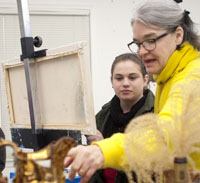Why I Give: A Q&A with Judy Nicholson Frey '64

Judy Nicholson Frey '64
Tell us a little about yourself now.
Retirement is great! One has time. Maybe that is Time with a capital T. Walking—hiking—is mainly what I do. The Class of '64 has a great hiking group, with self-led hikes in Nova Scotia, France, and New Mexico under our belts. Plus, Keith and I walked the 630 miles of the Southwest Coast Path, the Milford Track in New Zealand, things like that. And I still do a bit of volunteering with the Girl Scouts, mainly encouraging outdoor activities, and teaching fire building and orienteering.
What is your fondest memory of the College?
The first thing that comes to mind is the singing. Not that I can sing! But gathering with candles in the stairwell for a serenade or sitting upstairs in Main Hall with guitars and voices. Being together with the best people in the world.
What is your favorite tradition?
I went to three different high schools and many elementary schools. At Randolph-Macon I came to rest. I felt I could settle in and make real friends. Being an Eta and keeping up the Even/Odd rivalry helped to cement relationships in a very informal setting. I loved it!
Why is it important to you to give back to your alma mater?
Just think what Randolph-Macon gave to me! I've talked about the friends I made who are friends still and my first choice as partners in any adventure. Let me now mention academics, which you might agree are pretty important. I feel Randolph taught me to think. It broadened my horizon by 500 percent, at least. For someone like me who values liberal arts, it was perfect. And I believe it is still perfect for students today. I hope that all who profited from life behind the Red Brick Wall feel the same. Why would you not want to help make available to others the opportunity that meant so much to you?
Why did you want to specifically help the new M.F.A. in creative writing program?
What I specifically wanted to do was help the College. So I called and asked what they needed. Everyone should try doing that—all you will feel is good. You will know the person you are speaking with is smiling, if not jumping up and down! Donating to the creative writing program was their idea. They introduced me to Professor Gary Dop, who originally put the program together. Conversation with him convinced me that support for the M.F.A. in creative writing program was the right thing to do.
My gift was just enough to allow them to go ahead and launch it. If it had not been for me, or someone else like me, the program might not have gotten off the ground as quickly as it did. I didn't have millions to give, but I felt that what I did donate made a real difference.
What advice would you give a new graduate?
Keep up your ties to the College. Maintain your friendships as well as your links to career counseling and mentoring from alums. And remember to give back by talking up the College to prospective students and by donating to the annual fund every year. Randolph helped make you the best that you can be. Now it is your turn to pass it on.
Find out how you can pass it on and give back to the College by contacting The Planned Giving Office at 434-485-8050 or plannedgiving@randolphcollege.edu for more information.

